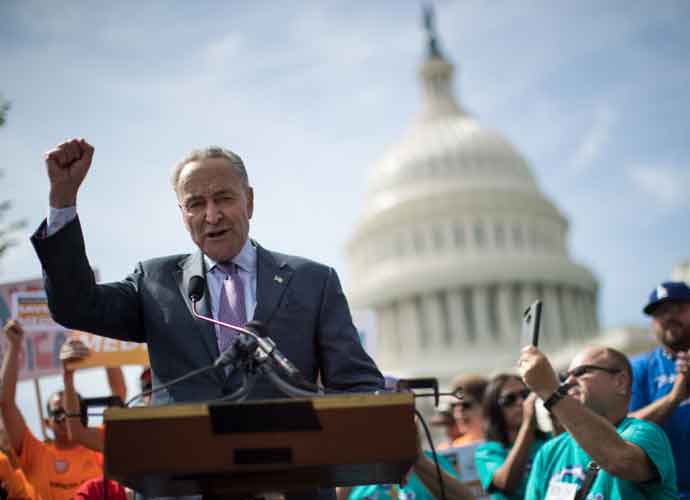

WASHINGTON, DC - SEPTEMBER 26: Senate Minority Leader Chuck Schumer (D-NY) speaks during a news conference in opposition to the Graham-Cassidy health care bill, September 26, 2017 in Washington, DC (Image: Getty)
The Senate and House of Representatives have passed a $1.9 trillion COVID-19 relief package that contains a wide range of proposals to help Americans struggling with the economic fallout of the pandemic.
The legislation provides another round of direct payments, as well as additional assistance for those unemployed, hungry, uninsured and at risk of losing their homes. It would also provide a bigger tax break for parents.
President Joe Biden and congressional Democrats argue that another massive bill is necessary to assist both people in need and the nation at large. The Senate removed the proposed $15 minimum wage, which the Senate parliamentarian determined couldn’t be included under the rules Democrats used for the bill.
Who is eligible to receive what?
Subscribe to our free weekly newsletter!
A week of political news in your in-box.
We find the news you need to know, so you don't have to.
Families who make less than $150,000 a year
If a family makes less than $150,000 a year, the bill will provide them with direct payments of up to $1,400 per person.
Individuals earning less than $75,000 would receive the full $1,400 and the amount would phase out for those earning more, up to $100,000.
Couples earning less than $75,000 would receive the full $2,800 and families with children would be eligible for an additional $1,400 per dependent.
The payments will be calculated based on either 2019 or 2020 income. Adult dependents, including college students, would be eligible for the payments.
The Biden Administration expects to release payments within one month.
The unemployed
Americans who are out of work would get a federal weekly boost of $300 through the start of September. Those enrolled in two key pandemic unemployment programs could also continue receiving benefits until that date.
Freelancers, gig workers, independent contractors and certain people affected by the virus could remain in the Pandemic Unemployment Assistance program for up to 74 weeks. Those whose traditional state benefits run out could receive Pandemic Emergency Unemployment Compensation for 48 weeks.
Support for Food Insecure
Food stamp recipients would see a 15% increase in benefits continue through September instead of expiring in June.
Families whose children’s schools are closed may be able to receive Pandemic-EBT benefits through the summer, if their state opts to continue it. The program provides funds to replace free and reduced-price meals that kids would have been given if in school.
If you’re behind on rent or mortgage
$19.1 billion would be sent to state and local governments to help low-income households cover back rent, rent assistance and utility bills.
About $10 billion would be authorized to help struggling homeowners pay their mortgages, utilities and property taxes. It would provide another $5 billion to help states and localities assist those at risk of experiencing homelessness.
Families with children
In addition to the stimulus payments, most families with minor children could claim a larger child tax credit for 2021, especially low-income parents.
Qualifying families could receive the child tax credit of $3,600 for each child under 6 and $3,000 for each one under age 18, up from the current credit of up to $2,000 per child under age 17.
If you’re sick or need health insurance
Americans who are sick, quarantining or caring for an ill loved one or child whose school is closed will receive an incentive to offer paid sick and family leave from your employer.
Americans who qualify for larger federal premium subsidies for Affordable Care Act policies would pay no more than 8.5% of their income towards coverage, down from nearly 10%.
Those earning more than the current cap of 400% of the federal poverty level, about $51,000 for an individual and $104,800 for a family of four in 2021, would be eligible for help.
Small business owners
The bill would provide $15 billion to the Emergency Injury Disaster Loan Program, which provides long-term, low-interest loans from the Small Business Administration. Severely impacted businesses with fewer than 10 workers will be given priority for some of the money.
$25 billion would also be provided for a new grant program specifically for bars and restaurants. Eligible businesses may receive up to $10 million and can use the money for various expenses, including payroll, mortgage and rent, utilities and food and beverages.
Who is out of luck?
Workers being paid at or just above the federal minimum wage of $7.25 an hour will not see a boost in pay.
Trump Media & Technology Group, the company that owns Truth Social, struck a deal with…
Attorney General Pam Bondi addressed the outrage surrounding the Justice Department's investigation into Jeffrey Epstein.…
Last month, Randi Weingarten, the President of the American Federation of Teachers (AFT), resigned from…
President Donald Trump's son, Eric Trump, celebrated the tenth anniversary of his father's first presidential…
Same-sex households are on a steady rise in the U.S., according to a survey conducted…
California Gov. Gavin Newsom (D) is on a tour in South Carolina with the state's…